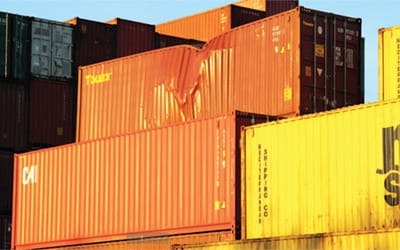Avoid Debt in Freight Forwarding
Freight forwarding is a crucial element of the global supply chain, facilitating the movement of goods across borders. However, within this industry, debt can often become an unwanted burden for businesses, impacting operations and hindering growth. To navigate these challenges, it’s vital for freight forwarders to adopt proactive strategies that mitigate the risk of debt accumulation.
7 Ways to Avoid Debt in Freight Forwarding Industry Are:
- Implement Effective Credit Management
- Streamline Operational Efficiency
- Diversify Client Portfolio
- Negotiate Favourable Terms with Suppliers
- Monitor Market Trends and Fluctuations
- Invest in Professional Development
- Maintain Transparent Communication
Implement Effective Credit Management
The cornerstone of avoiding debt in freight forwarding lies in prudent credit management. Establish clear credit policies, conduct thorough credit checks on customers, and set reasonable credit limits. Regularly reassess credit terms and promptly address any overdue payments. Maintaining a healthy cash flow is pivotal; hence, consider offering incentives for early payments or utilizing payment gateways that ensure swift transactions.
Signing up to a repeatable credit check service is a great way to check a companies credit before you decide to do business with them, and will give you a clear indication of what terms you are prepared to offer.
Also having different payment accounts can encourage customers to pay for example if you only hold a sterling account foreign customers who wish to pay in dollars or euro may shy away from you as they will need to pay an exchange rate every time you invoice them. Giving your customers an account in their currency and multiple ways to pay eliminates any hold ups and confusion over who will pay the exchange rate.
Streamline Operational Efficiency
 Enhancing operational efficiency not only optimizes resources but also reduces the likelihood of incurring unnecessary expenses that might lead to debt accumulation. Invest in modern technology and automation tools to streamline processes, improve accuracy, and minimize errors.
Enhancing operational efficiency not only optimizes resources but also reduces the likelihood of incurring unnecessary expenses that might lead to debt accumulation. Invest in modern technology and automation tools to streamline processes, improve accuracy, and minimize errors.
Effective route planning, inventory management, and streamlined documentation processes can significantly reduce costs and prevent financial strain. This all comes down to having a good efficient team around you make sure you train your staff in all your company policies and they know exactly how and when to implement your policies.
Diversify Client Portfolio
Relying on a limited number of clients can pose a risk to the financial stability of a freight forwarding business. Diversifying the client portfolio spreads risk across various sectors and geographic locations. Seek opportunities to forge partnerships with new clients while nurturing relationships with existing ones.
Cultivate a reputation for reliability and exceptional service to attract a broader clientele base. The catch phrase don’t put all your eggs in one basket captures this perfectly. Be diverse and able to adapt to different customers needs if you offer a service that you specialise in think about other industries which may use a similar service and reach out to those industry.
Focusing on one industry can be catastrophic if something happened world wide to wiped it out it could be the end of your business financial. By having multiple industries covered in your business you could afford to lose one if the worst should happen, you would still have an income from the other industries keeping your company financially strong.
Negotiate Favourable Terms with Suppliers
 Establishing strong relationships with suppliers is key to securing favourable terms. Negotiate contracts that align with your business goals and financial capabilities. Seek discounts for bulk purchases or early payments. Additionally, explore alternative suppliers to ensure competitive pricing and avoid over-reliance on a single source, which could lead to increased costs and potential debt.
Establishing strong relationships with suppliers is key to securing favourable terms. Negotiate contracts that align with your business goals and financial capabilities. Seek discounts for bulk purchases or early payments. Additionally, explore alternative suppliers to ensure competitive pricing and avoid over-reliance on a single source, which could lead to increased costs and potential debt.
This is paramount to getting the best for your company gaining quotes from multiple companies allows you to pick and choose who you feel is a good fit for your company and a great way to avoid debt in freight forwarding.
Monitor Market Trends and Fluctuations
Staying abreast of market dynamics, including shifts in currency exchange rates, fuel prices, and geopolitical developments, is essential. These factors directly impact freight forwarding costs and profitability. A proactive approach to adapting to market changes allows for informed decision-making, enabling businesses to mitigate potential financial risks and avoid debt in freight forwarding.
As the cost of world supplies fluctuates on a daily basis one of the biggest costs can be fuel surge charges as these go up and down daily with the stock market. knowledge is power literally in this case as if you know what the charges are you can factor them in on all your quotations, always allow for a little more after all your in business to earn money not lose it.
Fuel costs are one of the biggest and easiest ways to fall short and to avoid debt in freight forwarding you need to have you finger on the pump.
Invest in Professional Development
Knowledge is a powerful asset in navigating the complexities of the freight forwarding industry. Encourage ongoing training and professional development for your team to stay updated with industry trends, compliance regulations, and technological advancements.
Well-informed staff can contribute to operational efficiency and risk mitigation, ultimately preventing financial strain. Team training and morale are paramount to your company, just like a well oiled machine to keep it running smoothly you need to apply some lubrication. Keep your staff well informed and happy, team building exercises are good for this, although the day may cost your company it will pay you back ten fold. A happy work place is a productive work space, productivity breads profits and helps your company avoid debt in freight forwarding.
Maintain Transparent Communication
 Clear and transparent communication with clients, suppliers, and stakeholders is imperative. Clearly outline payment terms, contractual obligations, and expectations from both parties. Address any discrepancies or issues promptly to avoid misunderstandings that could potentially lead to payment delays or disputes, thus preventing the accumulation of debt.
Clear and transparent communication with clients, suppliers, and stakeholders is imperative. Clearly outline payment terms, contractual obligations, and expectations from both parties. Address any discrepancies or issues promptly to avoid misunderstandings that could potentially lead to payment delays or disputes, thus preventing the accumulation of debt.
Always make sure you have credit application form filled out by both parties. Check all the relevant information and have more than one way to contact the company you are dealing with, clear and confident exposure at the beginning of your relationship will stand you in good stead in the long tern helping to avoid debt in freight forwarding.
Conclusion
In conclusion, debt avoidance in the freight forwarding industry necessitates a proactive and multifaceted approach. By implementing effective credit management, streamlining operations, diversifying clientele, negotiating favourable terms, monitoring market trends, investing in professional development, and maintaining transparent communication, freight forwarding businesses can mitigate financial risks and steer clear of debt accumulation. At SARR Logistics UK communication between customers is key to our operation, we practice good company politics and always listen to our customers needs. If you do find yourself in debt for any reason there are lots of organisations out there to help with free advice including:









